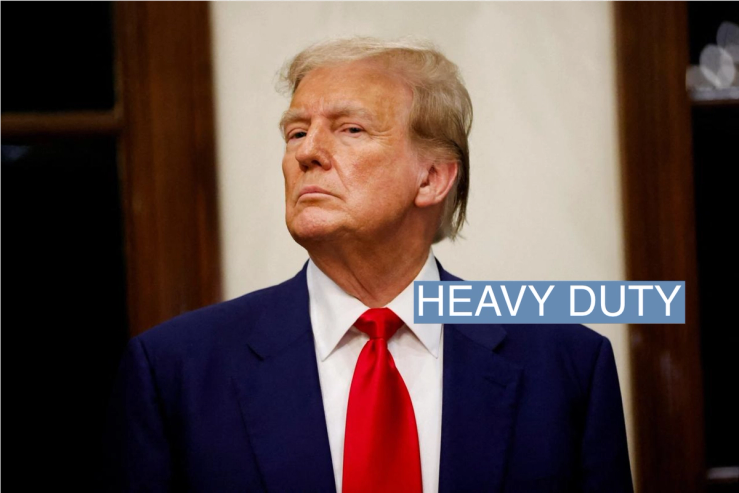The Scoop
Former President Donald Trump’s idea to implement a 10% tariff on all imported goods would spike prices by as much as $1,500 annually for American families, according to a new analysis from a top Democrat-aligned group first shared with Semafor.
Published by the Center for American Progress Action Fund, the report estimates that yearly costs would rise by $90 for food, $90 for pharmaceutical drugs, and $120 oil-related products like gasoline. The analysis provides an early look at how Democrats will likely use Trump’s trade plans to try and undercut his advantage with voters on the issue of inflation.
“A lot of that will take the form of price increases at the grocery store, at the gas pump, at the car dealership and on Amazon,” Brendan Duke, a senior director of economic policy at CAP and report co-author, told Semafor. “In an election over the cost of living, we have a candidate who’s proposing a $1,500 tax increase.”
Mainstream economists on the left and right tend to view tariffs as a tax borne by Americans, given companies tend to shift those costs to consumers in the form of higher prices on imported goods. Ryan Mulholland, an analysis co-author and senior fellow on international economic policy at CAP, said about 60% of imported goods come from friendly trading partners like Canada, Mexico, the European Union, Japan and South Korea.
“This proposal is not about China. It mostly taxes countries we have good relationships with, countries that are partners standing up for democracy and building a global economy that works for the middle class,” Mulholland told Semafor.
Know More
Trump aggressively deployed tariffs during his administration, and successfully moved swaths of the GOP away from its old free-trade consensus. He angered allies by imposing import taxes on steel and aluminum, and picked a trade war against China. He could be even more aggressive in a second term: Aside from floating the 10% baseline tariff on all imports, he has recently promised a 100% tariff on foreign-made cars and suggested a minimum tariff of 60% on Chinese goods.
“I’m a big believer in tariffs,” Trump said in a CNBC appearance earlier this month. “I fully believe in them economically when you’re being taken advantage of by other countries.”
For his part, President Biden has kept the status quo on trade, leaving many of those tariffs on Chinese goods in place, while pairing them with export controls on US-produced semiconductors meant for China. U.S. Trade Representative Katherine Tai has also called tariffs “an important defensive tool.”
The View From GOP senators
GOP senators that spoke to Semafor brushed off Trump’s push for a 10% universal tariff, suggesting he was unlikely to pursue it, and said they preferred imposing limited tariffs with the goal of leveling the playing field between the US and strategic rivals.
Sen. Mike Rounds, R-S.D., called the universal tariff proposal “food for thought.”
“[Tariffs] should be used sparingly,” Rounds said. “I don’t think they should be on everything because I think long-term we’re better off if we’re able to compete and expand our markets.”
“I think a shotgun approach probably wouldn’t be my preference,” said Sen. Kevin Cramer, R-N.D., who downplayed the possibility of Trump triggering a new round of trade wars. “I look forward to him balancing trade in our favor instead of the other way around,” he added.
The View From Heritage
Still, some even conservative policy experts are apprehensive about Trump’s trade plans. Andrew Hale, a senior trade policy analyst at the right-leaning Heritage Foundation, argued Trump is “understandably proud” of renegotiating major trade agreements like the USMCA with Canada and Mexico. But he warned that imposing a universal tariff could spark further retaliation that drags down the American economy.
“Once you go down that road, then it can quickly escalate into a ti-for-tat retaliation,” Hale told Semafor. “So it could potentially go up to the 20% that we saw with the Smoot Hawley Tariff Act of 1930.”
The View From The Trump campaign
Asked about Trump’s universal 10% tariff, the campaign offered a statement about the candidate’s plans for the auto industry instead.
“President Trump will reverse Joe Biden’s extreme electric vehicle mandate on Day One,” Trump campaign spokesperson Karoline Leavitt said in a statement. “He will protect the freedom of Americans to drive whichever vehicle they choose, enhance his tough tariffs on Chinese-imported cars, and save the U.S. auto industry for generations to come.”
Notable
- Matthew Yglesias wrote about Trump’s tariff proposal back in February for his Substack ‘Slow Boring,’ saying it was “remarkable, in my view, that Donald Trump is running on a gigantic regressive tax increase and nobody seems to care.”
- Trump adviser Stephen Miller offered an impassioned defense of imposing a universal tariff earlier this year. “‘Free trade’ is a false religion that melts minds. A tariff is not a tax on “every American.” (That’s the income tax). A tariff is a tax assessed on FOREIGN goods made by FOREIGN labor,” Miller wrote on X. “Under a tariff system, if you make it here and build it here, you pay no tax. Simple.”


